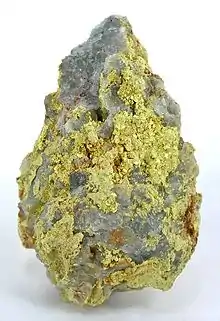| Ferrimolybdite | |
|---|---|
 Ferrimolybdite crystals from the Kingman District, Mohave County, Arizona | |
| General | |
| Category | Molybdate mineral |
| Formula (repeating unit) | Fe3+2(MoO4)3·8(H2O) or Fe3+2(MoO4)3·n(H2O) |
| IMA symbol | Fmyb[1] |
| Strunz classification | 7.GB.30 |
| Crystal system | Orthorhombic |
| Crystal class | Dipyramidal (mmm) H-M symbol: (2/m 2/m 2/m) |
| Space group | Pmmn |
| Unit cell | a = 6.665, b = 15.423 c = 29.901 [Å]; Z = 8 |
| Identification | |
| Color | Canary-yellow, straw-yellow, greenish yellow |
| Crystal habit | Acicular tufted to radial aggregates; powdery, earthy |
| Cleavage | Distinct on {001} |
| Fracture | Uneven |
| Mohs scale hardness | 1-2 |
| Luster | Adamantine, silky, earthy |
| Streak | Light yellow |
| Diaphaneity | Transparent to translucent |
| Specific gravity | 2.99 |
| Optical properties | Biaxial (+) |
| Refractive index | nα = 1.720 - 1.810 nβ = 1.730 - 1.830 nγ = 1.850 - 2.040 |
| Birefringence | δ = 0.130 - 0.230 |
| Pleochroism | X = Y = clear to nearly colorless; Z = dirty gray to canary-yellow |
| 2V angle | 26° to 32° (calculated) |
| References | [2][3][4] |
Ferrimolybdite is a hydrous iron molybdate mineral with formula: Fe3+2(MoO4)3·8(H2O)[3] or Fe3+2(MoO4)3·n(H2O).[2] It forms coatings and radial aggregates of soft yellow needles which crystallize in the orthorhombic system.
Discovery and occurrence
It was first described in 1914 for an occurrence in the Alekseevskii Mine in the Karysh River Basin, Khakassia Republic, Siberia, Russia.[2] It was named for its composition (ferric iron and molybdenum).
It occurs as an oxidation product of molybdenum bearing ore deposits. Associated minerals include: molybdenite, pyrite and chalcopyrite.[3]
References
- ↑ Warr, L.N. (2021). "IMA–CNMNC approved mineral symbols". Mineralogical Magazine. 85 (3): 291–320. Bibcode:2021MinM...85..291W. doi:10.1180/mgm.2021.43. S2CID 235729616.
- 1 2 3 Ferrimolybdite on Mindat.org
- 1 2 3 Ferrimolybdite on the Handbook of Mineralogy
- ↑ Ferrimolybdite data on Webmineral.com
This article is issued from Wikipedia. The text is licensed under Creative Commons - Attribution - Sharealike. Additional terms may apply for the media files.